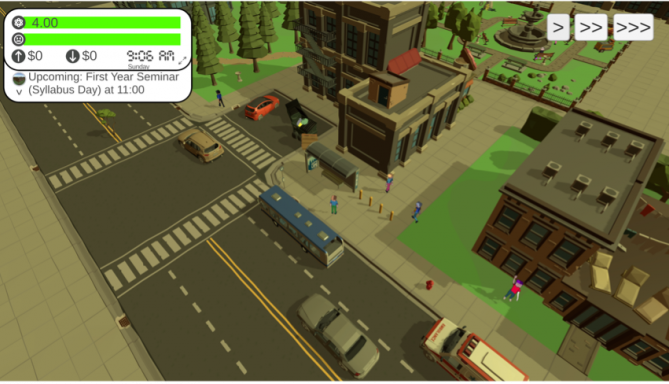
About game based learning
We are building an online game that helps budding young scientists explore career pathways and opportunities. Called College Simulator, this game is a virtual online environment that helps prospective college students experience the opportunities and challenges faced in their first college semester. College Simulator is based on the established Success Prints Crash Course® board game, which was developed at Montana State University by education professor Dr. Tricia Siefert with support from MSU's Blackstone Launchpad and students and alumni of MSU. The board game has been played and evaluated at high schools throughout Montana and around the world, including many rural and reservation schools.
 As the board game is transformed into a virtual environment, opportunities exist to highlight specific pathways, including STEM fields associated with Montana NSF EPSCoR-related research. Players can meet virtual characters whose career paths and research mirror that of existing EPSCoR students and faculty, and players can explore career paths that model those that lead to fields relevant to EPSCoR such as hydrology, optical engineering, and more.
As the board game is transformed into a virtual environment, opportunities exist to highlight specific pathways, including STEM fields associated with Montana NSF EPSCoR-related research. Players can meet virtual characters whose career paths and research mirror that of existing EPSCoR students and faculty, and players can explore career paths that model those that lead to fields relevant to EPSCoR such as hydrology, optical engineering, and more.
What is the digital game like?
 Players navigate a virtual 3D campus environment via a Web-based portal (a game console such as Xbox is not required). Just like a “choose your own adventure” novel, players are faced with various college-related choices that require balance and trade-offs….sleep vs. social opportunities; work vs. study. Through the game’s academic system, players learn about coursework for various majors, helping them make informed decisions about their own major choice.
Players navigate a virtual 3D campus environment via a Web-based portal (a game console such as Xbox is not required). Just like a “choose your own adventure” novel, players are faced with various college-related choices that require balance and trade-offs….sleep vs. social opportunities; work vs. study. Through the game’s academic system, players learn about coursework for various majors, helping them make informed decisions about their own major choice.
Learn more about the game and its development by watching the recent "Innovations in Science Communication: Game Based Learning" presentation hosted by Dr. Tricia Seifert and Suzi Taylor.This informative and interactive presentation taught attendees about how games play a role in education, outreach, and science communication. Watch the presentation by clicking on the YouTube video below.
About the presenters:
Dr. Tricia Seifert is a professor of adult and higher education at Montana State University and founder of SuccessPrints Crash Course, a board game that uses game-based learning to let students explore college life. She has worked with students and teachers across Montana and around the world to research the impacts of games on student success.
Suzi Taylor is director of the Science Math Resource Center at MSU and an EPSCoR Education-Outreach-Diversity team member for the last 10 years.
How does it advance the goals of Montana NSF EPSCoR?
The storylines and academic and social systems of College Simulator can promote STEM major exploration for pre- and first-year college students. Players are given assignments a first-year student may receive in college. This gives players a window into what the coursework for each type of major may be like when they arrive at college, and we can design these assignments based on the host of majors tied to Montana NSF EPSCoR’s current research theme: water.
We also envision creating storylines in which the player’s friends are pursuing STEM majors. These storylines will address the opportunities for curricular and co-curricular engagement and exploration within STEM majors as well as long-term career planning within STEM fields.
Finally, we will develop the exploration of college support areas, like tutoring, counseling, academic advising, and leadership development, creating a number of academic mini-games (a game within the game) that will allow players to explore scenarios and confront the challenges associated with different types of majors and careers.
Although the board game is played in a group environment, the digital simulation can be played by one person—offering strong support for students in rural areas or for those learning remotely during COVID-19, thus helping achieve EPSCoR’s goals of broadening participation.
Interested in learning more about game based learning? Want to be involved and kept up to date with the game's development? Contact Suzi Taylor, taylor@montana.edu